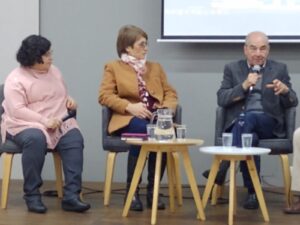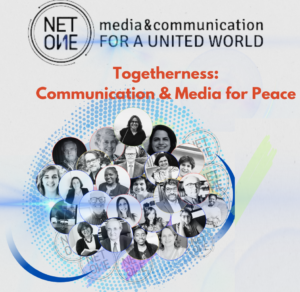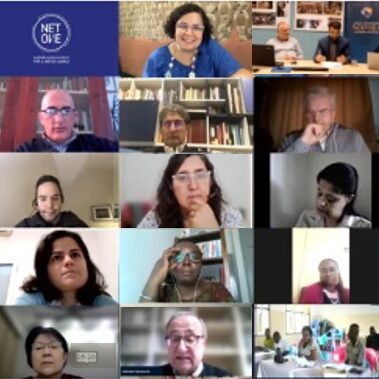
19.11.2022
Communication and Media – Twenty-five years after Chiara Lubich was awarded an honorary doctorate in Social Communication, the international NetOne network organized a global meeting to reflect on the phenomenon of fake news, social polarization, digital culture and the culture of peace.
By Silvano Malini (Italy)
This question calls on us and arises from the multiple challenges that the pandemic time has left behind. Today we celebrate the 25th anniversary of Chiara Lubich’s honorary doctorate in Social Communications. With several members of our NetOne network, we asked ourselves what to do in the midst of so many social rifts. The conviction emerged that her legacy of life, which can be summarized as living for unity, for universal fraternity, in every sector of social life, is the need and the cry of humanity today.”
This is how Isabel Gatti, Argentine researcher and teacher, international coordinator of NetOne, introduced her speech at the opening of an international online seminar held on Nov. 19, with simultaneous face-to-face sessions in Loppiano (Italy), Medellín (Colombia), Kinshasa (Democratic Republic of Congo) and Nairobi (Kenya).
“Communication and media, in dialogue toward fraternity? 25 years after Chiara Lubich was awarded a doctorate in Social Communication,” is the title of the meeting, sponsored by Sophia University Institute, Loppiano and the New Humanity NGO. About 200 people from all over the world followed and interacted with the streaming broadcast, thanks to simultaneous translation into English, French, Spanish, Portuguese and Italian.
It was an opportunity to reflect on strategies and methods suitable for realizing the goal of contributing to the building of universal brotherhood, focusing on some of the biggest challenges facing communicators today, such as the phenomenon of fake news, social polarization, digital culture and the culture of peace.
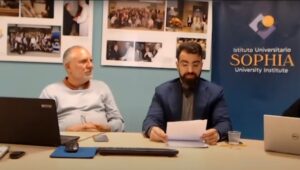
NetOne is an international association of media and film professionals, teachers, researchers and practitioners of communication and information technologies. It is a space for dialogue in which to share professional experiences, cultural insights, training paths, actions and projects for media communication that fosters fraternity. It is inspired by the principles and values of Chiara Lubich’s spirituality of unity.
In 1997, Saint John’s University in Bangkok named Chiara Lubich among its doctors for her “extraordinary wisdom in the use of modern media technologies in proclaiming the Word of Life.” Chiara herself said at the time, “It is precisely now that the world, even though it seems to be plunging toward the abyss of new wars, calamities and evils previously not even imagined (…) desires to be more united and calls for universal brotherhood, it is precisely now that these powerful means of communication are available to humanity.” Means that, as she later stated, have “a vocation for the unity of peoples.”
Professor Chainarong Monthienvichienchai, then vice chancellor of the university that awarded the doctorate and its main promoter, attended the seminar and recalled the “central role” that communication played in Chiara’s life. “Her writings, and thus the language with which she expresses her experience, contain a whole linguistic repertoire that distinguishes it from traditional Christian language,” he said. “We were inspired by her conviction that it is possible to achieve mutual understanding with all the great religious traditions of humanity through dialogue and mutual respect.”
Gatti went on to point out that “although economic, social, political and communication challenges show an increase in inequality, we also see multiple efforts of many people and institutions from the various fields of communication working for what some call ‘another communication,’ promoting ‘a new communication.’ That is why we have chosen to realize this ‘grateful memory’ by showing some of these efforts, which are already generating a new culture.”
From Brazil, journalist and lecturer Aldo Quiroga showed how the answer to violence exacerbated by political polarization is journalism, which is “the possibility of provoking encounters.” A response that is given “in the continuity of work,” although “many of us feel like the mythological Sisyphus, who pushes a stone uphill, which will return to the point of origin and which, in any case, we return the next day to face, because only in the consistent and responsible exercise of the vocation to communicate can we help overcome this challenging moment.” “There is no path to peace without the tools of communication, which we use as a craftsman uses a chisel or a baker uses an oven.
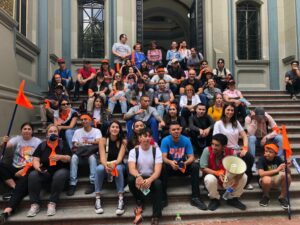
“It is crucial to think about communication and put it into practice as a community-building tool,” said Colombian professor Cristina Montoya of Medellín, who cited some of the behaviors communicators for the fraternity are maintaining. “Our path in communication has meant, for example, to favor community radios, so-called alternative communication processes or communication for social change and, in a special way, relationships; not only interpersonal, but also social and institutional.” “We have begun to reread this city, recognized as an icon of drug trafficking and war, with the goal of redefining it and making it possible for places that have become gray and smelly due to lack of communication and inequality to be filled with color and give birth to narratives of respect, inclusion and mutual recognition.”
Initiatives pursuing these goals were reported from Benin, Italy and different parts of the world, while Emmanuel Badibanga, from the Democratic Republic of Congo, expressed, “In dialogue with fraternity it is possible to commit oneself, according to the mandates of one’s conscience, to carry out a job that is part of the solution to the problems we face.” Chiara Lubich’s conviction is also true: “Fraternity offers surprising possibilities. It makes it possible to reconcile and enhance experiences that would otherwise risk becoming irremediable conflicts.”

